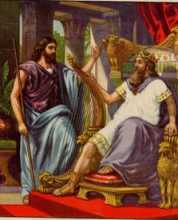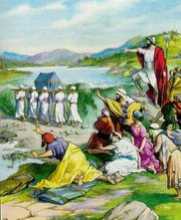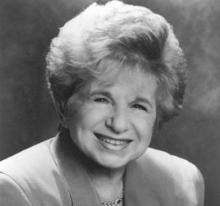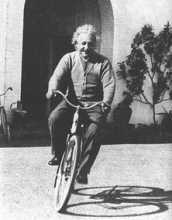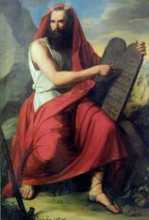Shabbat: Parsha Shoftim
Shabbat Shalom and welcome to Judeo Talk. The Torah portion for this week is Parsha Shoftim, Deuteronomy 16:18-21:9.
There is something of a problem with large-scale social order based on religious mysticism. Namely, that any literate person who can put on a good act is capable of pretending to have divine knowledge. This issue is the basis of a significant portion of the written laws of ancient civilizations. A particularly well-known case is that of the Babylonian king Hammurabi. In approximately 1790 BCE, King Hammurabi told his people that the gods had come to him the night before and told him the law. This is hardly the earliest case of codified law in the ancient world, but it stands out by its explicit claim of divine ordination. This is all well and good for just, fair laws, but it's easy to see how dubious claims of godly inspiration can result in tyranny.
Parsha Shoftim addresses this, among other, issues. First, this is one of the earliest sections of the Torah that specifically discusses the nature of a proper Jewish king. Moses tells the Israelites to appoint a king as soon as they settle the Promised Land and select their judges. This in itself is an important order of events. The law literally comes before the king. Then, when a king is selected, he is to be given a series of heavy restrictions. The most important duty of any king of Israel is that he is obligated to transcribe a copy of the Torah, word for word, under the supervision of priests. After the transcription, he is obligated to read the text every day for the rest of his life. In short, the king is supposed to know the law inside and out, plus he should have a healthy fear of God at all times.
But there are other requirements for the king that are just as important. In short order, Jewish kings are forbidden to pursue their own gain in practically all of its forms. They aren't allowed to seek out any expansion of their treasury, their vineyards or the horse stock. Translation: You're not allowed to go to war for material gain, you're not allowed to be a materialistic drunkard and you're not allowed to enter trade agreements with enemy nations (horse trading was a major industry in Egypt at the time). The Torah makes the purpose of a king clear. They aren't so much rulers as they are caretakers.
Directly following the passages about kingship, Shoftim address the concern of false prophets. Its metric for identifying fakers is rather elegant in its simplicity. A real prophet only gets his information from God, so nothing he says could possibly be untrue. If someone claiming to be a profit is ever wrong about anything after saying that it comes from God, then he's not a prophet. Given the fallible nature of humanity, the worst that can happen is someone might get away with conning the people for a short time. As soon as he makes a mistake, he better be prepared to run.
The lesson we should take away from this section of Shoftim (it's a loaded parsha, so there's a lot we won't get to this time around) is that we need to have systems in place for leadership accountability. While the Torah is far from misanthropic, it certainly recognizes that people are capable of all manner of abuses, especially those who have power. There's no such thing as a 100% safeguard against corruption, but we also aren't left with just the honor system. We all deal with and are leaders of many sorts in our lives. Parents, bosses, clergy, political representatives, landlords, etc. Though we can't apply the laws of the Torah directly to these leaders in our lives, we can at least chasten ourselves when we take on our own positions of leadership. If the Torah gives us nothing else, it at least provides a means for self-reflection and personal preparation.
